Effective communication and targeted marketing campaigns are key to growing your business. One key element that fuels these initiatives is B2B contact data. But what exactly is business contact information, and why is it crucial for businesses to obtain high-quality databases?
In this article, we will explore:
- Attributes included in B2B contact data
- Various approaches to acquiring reliable data,
- How to find reliable data providers and where to purchase b2b contact data,
- How to manage in-house data collection methods.
Additionally, we will address the difficulties companies encounter in obtaining reliable databases. Lastly, we will focus on how to effectively utilize this data
What is B2B contact data?
B2B contact data comprises valuable information about businesses and the individuals within them. It encompasses details such as company names, addresses, phone numbers, email addresses, job titles, and more. Once all this data has been grouped together, it is called B2B contact lists.
This B2B data acts as a gateway to establishing direct lines of communication with your potential clients and key decision-makers.
Of course, before contacting qualified prospects, you first need to identify them using other types of data. We're talking here about Firmographic data, which includes company’s name, number of employees, revenue, location, industry sector, and more.
But once you identify these prospects, this B2B data becomes your trusted ally. Having the right business data give you the opportunity to connect with the individuals who are most likely to benefit from your products or services.
Good news : If you’re looking for contact information, you can find over a billion contacts in our B2B database, along with all their associated attributes.
What attributes does B2B contact data include?
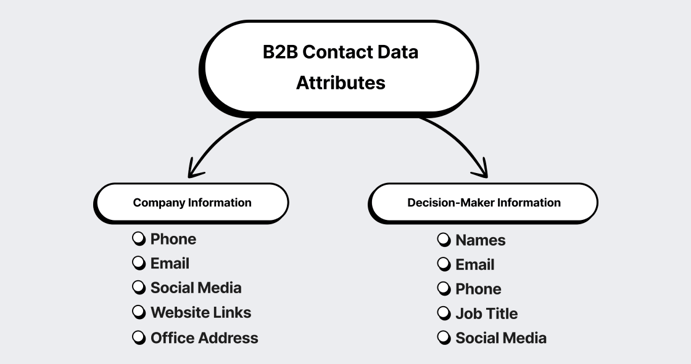
It typically includes various types of information that help businesses reach out to individuals within other businesses. Here is a list of commonly included information:
Companies Contact Information:
- Phone Numbers: Direct telephone lines to reach business.
- Email Addresses: Primary email contacts for companies.
- Social Media Profiles: Links or handles to social media accounts associated with the business.
- Office Address: Company location address.
- Website: Website links associated with the company name.
Decision-Maker Contact Information:
- Names: The first and last name of the contact person.
- Email and Phone Number: These information generally includes e-mail addresses and telephone numbers linked to the company. Some providers may offer private data but take care not to exceed privacy regulations.
- Job Titles: Positions held by decision-makers within the company, such as CEOs, CMOs, or department heads.
- Social Media Profiles: Links to the contact person's social media accounts or the company's social media pages. We're mostly talking about LinkedIn profiles here, as this is the social network where you can find the most interesting information.
The Value of B2B Contact Data
Let's explore the inherent value of B2B contact information and discover how businesses can leverage it for maximum impact.
Streamlined Sales and Marketing Processes
Access to qualitative B2B data facilitates sales processes by revealing information about the needs, preferences, and pain points of potential customers. Armed with this information, marketing and sales teams can deliver targeted solutions, nurture relationships, and optimize their sales pipelines.
Personalized Communication and Relationship Building
It enables businesses to establish meaningful and personalized communication with their prospects. By tailoring messaging and engaging in relevant conversations, companies can build trust, strengthen relationships, and enhance customer loyalty.
Risk Mitigation and Regulatory Compliance
Validating and updating this data ensures compliance with data protection regulations. It also minimizes the risk of using outdated or inaccurate information. By adhering to data privacy guidelines, businesses can maintain the trust of their clients and protect their reputation.
How to use B2B Contact Data?
When it comes to utilizing B2B contact information, it's essential for businesses to understand the value of multiplying contact points. Engaging with prospects through various channels not only increases the chances of establishing meaningful connections but also aligns with their preferred communication methods.
According to statistics on prospection by HubSpot, 8 out of 10 prospects prefer talking to sales representatives over email, while half of buyers prefer conversations over the phone. As we climb the organizational ladder, the preference for phone calls increases, especially when engaging with high-level executives.
Prospects are also open to communicating with sellers at industry events (34%), via LinkedIn (21%), text (21%), voicemail (21%) and social media (18%).
By diversifying contact points, businesses can effectively leverage B2B contact data to engage with prospects and maximize their chances of success.
Here is a list of uses for this data:
- Cold Calling: Reach potential B2B prospects via phone to introduce products or services and generate leads
- Email Marketing: Send targeted messages and promotional content.
- Social Media Engagement: Companies can connect with prospects through social media platforms like LinkedIn.
- Direct Mail Campaigns: Companies can send physical mailers, brochures, or product samples to prospects using the provided postal addresses.
- Personalized Sales Outreach: Sales representatives can use the provided contact details to tailor their pitches and address specific pain points.
- Account-Based Marketing (ABM): Companies can use the provided contact information to target accounts and engage with decision-makers directly.
- Customer Retention: Companies can provide support, offer upgrades or additional services, and maintain a strong relationship.
Acquiring High-Quality Data by Partnering with Reputable B2B Data Providers
In the quest for high-quality B2B data, partnering with reputable B2B data providers can be a game-changer. These providers specialize in curating and maintaining extensive databases of accurate and up-to-date B2B contact information.
By leveraging the expertise of these data providers, companies can :
- Fuel effective marketing efforts
- Boost sales prospecting efforts
- Establish direct connections with their target audience
How to choose a data provider
Data Quality and Accuracy
Ensure the provider offers accurate and reliable data. Inquire about their data collection methodologies, validation processes, and data maintenance practices. Look for providers that prioritize data quality and have robust mechanisms in place to ensure accuracy.
You'd be better off using higher-quality data, even in smaller quantities, to achieve better results rather than using a large quantity of low-quality data. Of course, the best B2B providers such as InfobelPro can supply you with large volume of top quality business data.
Industry Coverage and Target Audience
Assess the provider's industry coverage and whether they align with your target audience. Consider if they have data specific to your industry and if their database includes the geographic regions relevant to your business. A provider with comprehensive coverage in your target market will offer more relevant and valuable data.
Data Customization and Segmentation
Determine if the provider can tailor the data to your specific requirements. Look for customization options such as filtering by job titles, company size, or other relevant attributes. The ability to segment and personalize data ensures you receive the most relevant information for your business needs.
Data Compliance and Privacy
Verify that the provider complies with data protection regulations such as the GDPR or CCPA. Ask about their data sourcing practices and how they ensure data privacy and security. A reputable provider will prioritize ethical and legal data usage and have robust measures in place to protect sensitive information.
Data Update Frequency
Inquire about the provider's data update frequency. Regular updates ensure you have access to the most current and accurate information. Using a data provider who invests in the processes of maintaining and verifying data allows you to avoid outdated data. It avoids wasting time trying to contact companies that no longer exist or whose contact details have changed.
Customer Support
Assess the provider's customer support capabilities and response times. A reliable provider will have responsive customer support to address any concerns or data-related issues promptly.
Pricing and Contract Terms
Consider the pricing models offered by the provider. Evaluate the cost in relation to the data quality and value they provide. Compare prices and contracts from different providers to find one that offers a good balance of cost and data quality.
Reputation and Customer Reviews:
Research the provider's reputation in the industry and look for customer reviews. Seek feedback from other businesses who have used their services. A reputable customer database provider will have positive reviews and a proven track record of delivering high-quality B2B contact data.
EXAMPLES OF the best B2B contact data providers
There are a number of high-quality B2B contact data providers on the market in 2025, from multinational companies listed on the stock market to local players focussing on niche markets.
Find below a few examples of reliable providers that users mostly choose and short descriptions of each to help you better understand what each offers:
InfobelPRO
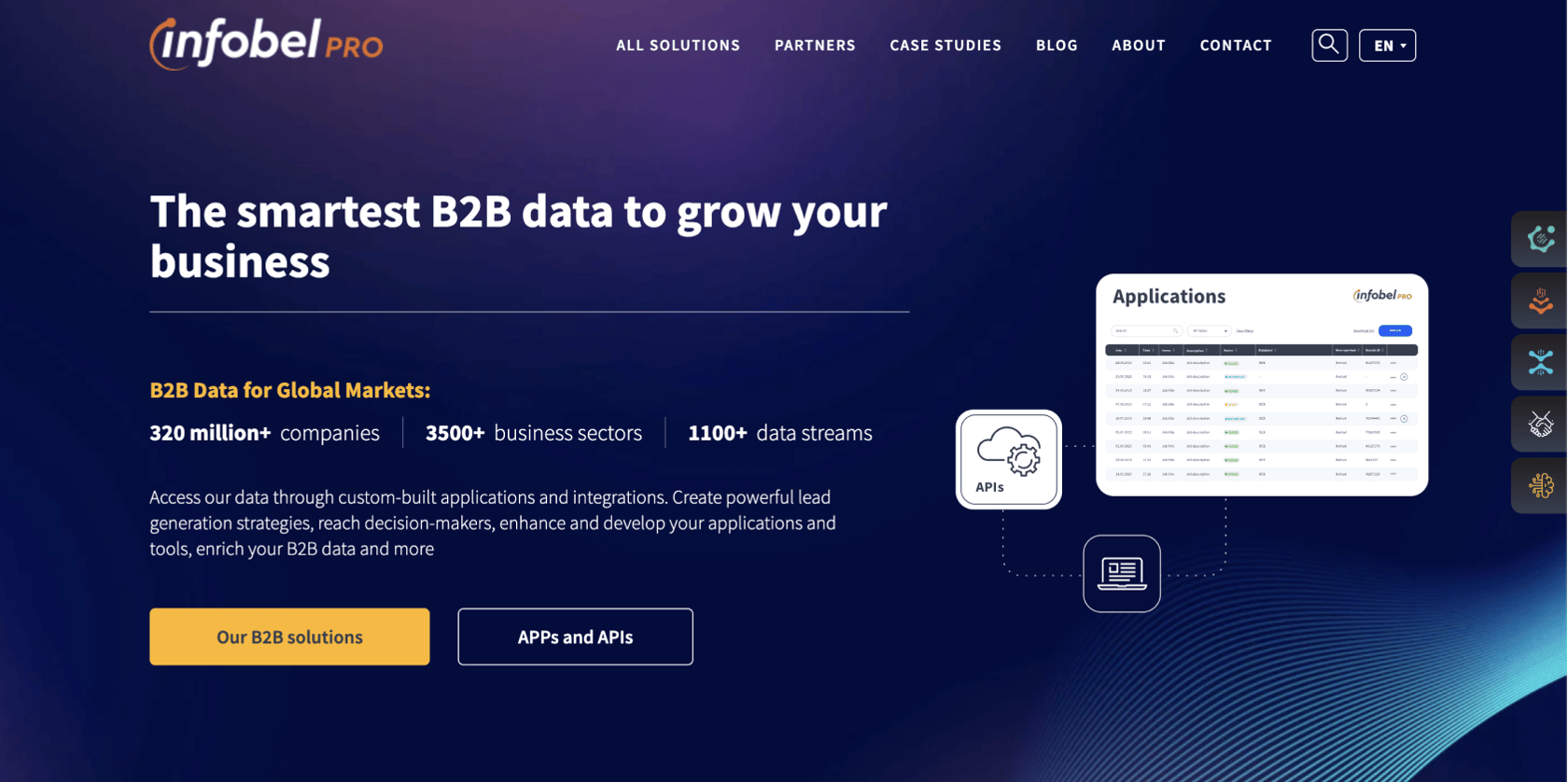
Founded in 1995 in Belgium and operating worldwide, InfobelPRO provides a comprehensive suite of business data and B2B contact information services. They have one of the largest existing contact databases, which includes information on over 650 million executives and nearly 400 million companies. Their solutions help businesses obtain accurate and up-to-date information about companies, executives, and professionals. This information can be utilized for market research, lead generation, and targeted customer outreach.
ZoomInfo
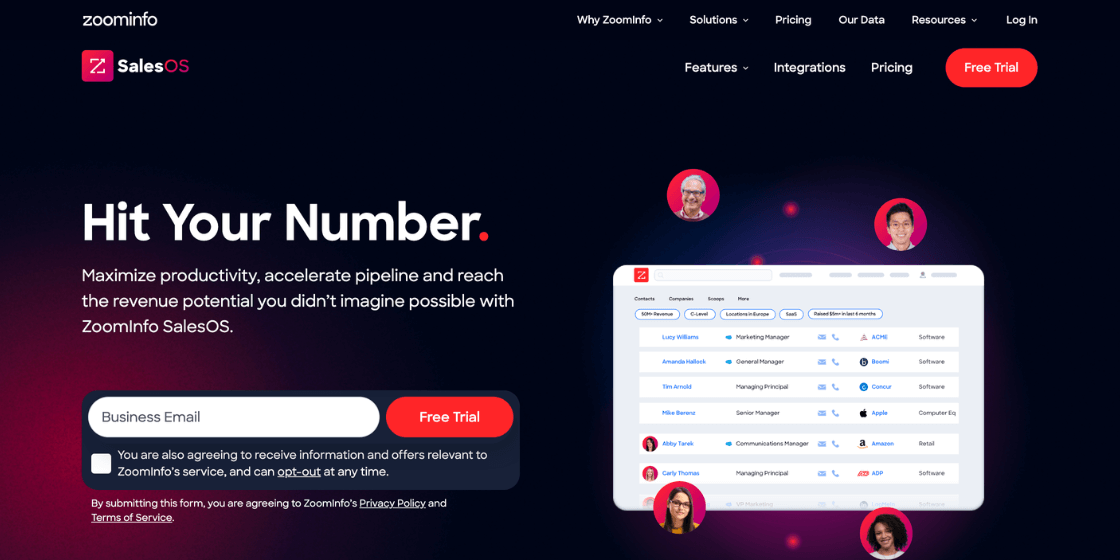
Founded in 2007, ZoomInfo provides a wide range of B2B intelligence services. Their offerings include access to a vast database of company profiles, contact information, and intent data. It enables businesses to identify and connect with potential customers, fuel sales and marketing campaigns, and drive sales growth.
Dun & Bradstreet
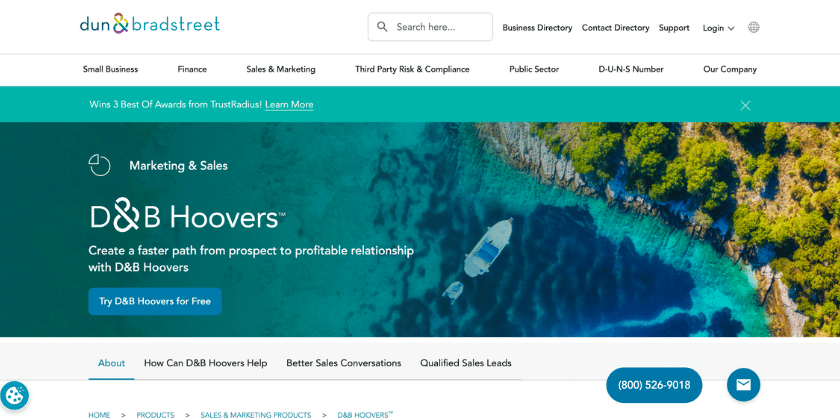
D&B offers comprehensive business intelligence services. They provide companies with valuable insights, analytics, and company profiles. It enables companies to support sales and marketing teams, risk assessment, and strategic decision-making.
BoldData
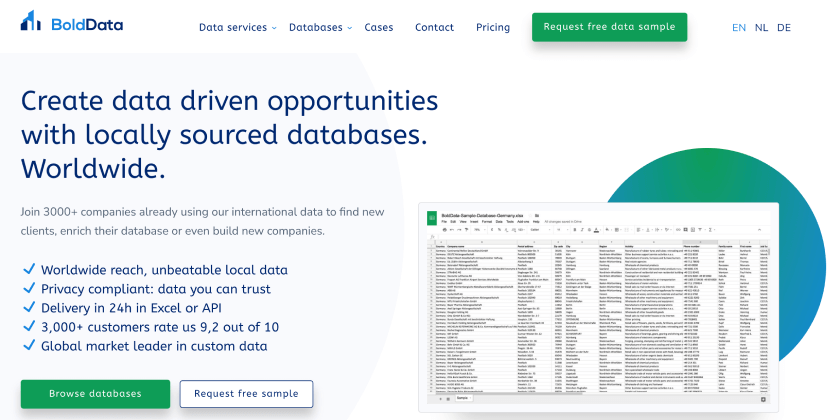
BoldData is a trusted B2B data provider in the Netherlands, specializing in comprehensive and reliable business data for diverse industries. Their data solutions help businesses make informed decisions and stay competitive.
Linkedin Sales Navigator
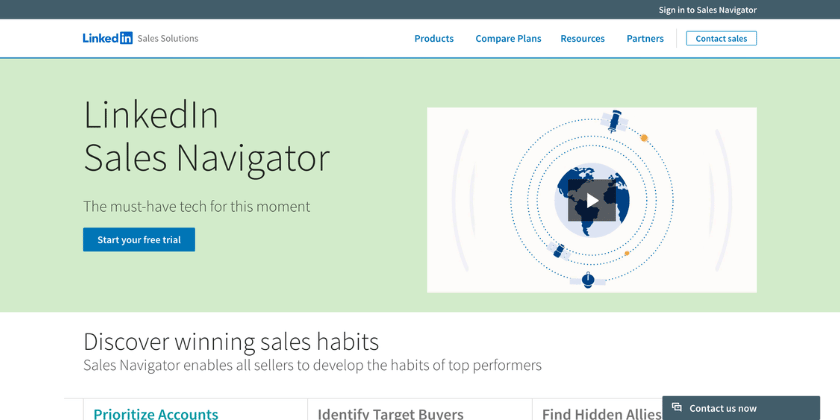
LinkedIn Sales Navigator is a sales enablement platform that provides advanced tools and insights for social selling and prospecting. With features like lead recommendations, CRM integration, and InMail messaging, it helps sales professionals identify, engage, and nurture potential customers effectively.
Cognism
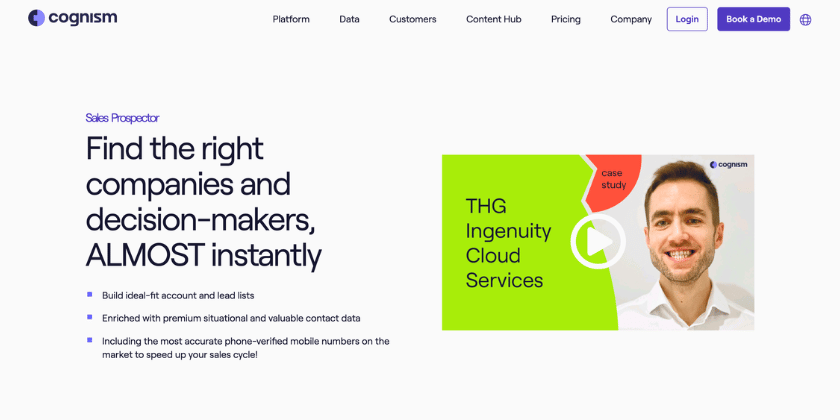
Founded in 2015 in United Kingdom, Cognism is a B2B sales intelligence platform based in London. It offers a Chrome extension for lead capture, email outreach tools for personalized campaigns, a lead scoring system, and analytics to track sales activities.
Lusha
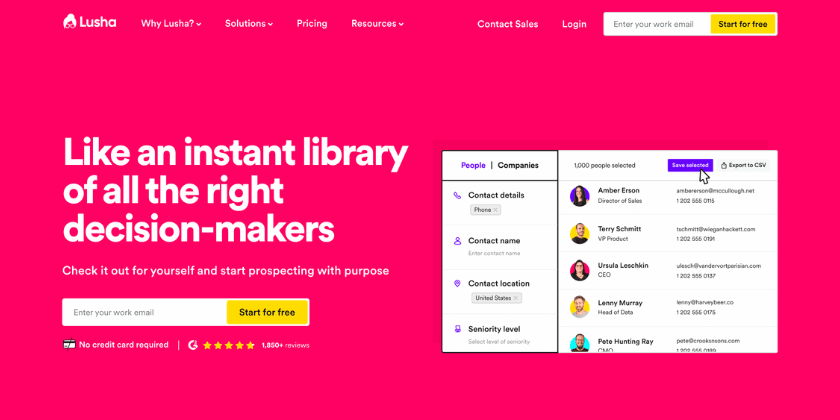
Lusha is a sales intelligence platform that was founded in 2016. It helps businesses find decision-makers using fresh, dynamic, and accurate data. Lusha's services include prospecting, lead generation and sales intelligence.
Acquiring B2B Contact Data with In-house data collection methods
To acquire high-quality B2B contact data, businesses can leverage in-house data collection methods. By utilizing various sources, companies can gather accurate data about their target audience.
Here are the key sources commonly used in in-house data collection:
Public Online Sources
Business can collect a wealth of data from public online sources. This includes government directories, industry association websites, business listings, and public records. Companies can gather valuable company information, key contact details, and industry-specific data by accessing these sources.
Physical Sources
Physical sources involve gathering B2B contact data through offline methods. This includes collecting business cards at networking events, trade shows, conferences, and other industry gatherings.
To ensure the accuracy and relevance of acquired data, companies can manually input contact information from physical sources into their databases.
Web Scraping
Web scraping involves extracting data from websites using automated tools or scripts. It enables businesses to collect B2B contact data from a wide range of online sources. Companies can use natural language processing and web crawling to collect contact information from company websites, directories, and online platforms.
Before engaging into web scraping activities, in-house team should consider the legal risks and potential liability, as well as the underlying costs (that rise quickly with the volume of data collected).
Lead Magnet Content
Lead magnet content refers to valuable resources or incentives offered to prospects in exchange for their contact information. This can include e-books, whitepapers, case studies, or exclusive industry reports. Businesses can collect B2B contact data directly from interested individuals.
Sales an marketing eams can do this by creating engaging content and using lead capture forms on landing pages or through pop-ups.
Social Media
Social media platforms have become valuable sources for data. Businesses can leverage platforms like LinkedIn, Twitter, and professional networking groups to identify and connect with potential business contacts.
By engaging with relevant communities or participating in industry discussions, companies can gather B2B contact data from professionals on social media.
Be careful, these solutions may seem advantageous at first glance, but they often cost money to set up and time to manage.
Challenges in Obtaining Reliable B2B Contact Data
Acquiring reliable B2B contact data is crucial to marketing and sales success, but it comes with its fair share of challenges. In this section, we will explore the common obstacles businesses face when obtaining reliable B2B contact data and discuss how to overcome them.
Data Accuracy and Completeness
One of the main challenges in obtaining reliable data is ensuring its accuracy and completeness. Personnel changes, company restructurings, or incorrect entry of contact details can quickly make contact information outdated.
As a result, incomplete or inaccurate data can lead to wasted resources and missed opportunities. To mitigate theses challenges, in-house teams should conduct regular data verification, validation, and enrichment of business contact data.
Data Decay and Aging
Data has a limited shelf life. Professionals change jobs, companies undergo mergers or acquisitions, and contact information becomes outdated. The continuous decay of contact data poses a challenge in maintaining an up-to-date and reliable database. Implementing regular data appending, cleansing and updating practices helps combat data decay and ensures the accuracy of contact information.
Data Privacy and Compliance
In an era of increasing data privacy regulations, such as GDPR and CCPA, businesses face challenges in obtaining B2B contact data while adhering to legal requirements.
Ensuring compliance with data protection regulations, obtaining necessary consents, and handling data in a secure and ethical manner are critical considerations. Companies must strike a balance between data acquisition and respecting the privacy rights of individuals.
Data Source Reliability
The reliability of data sources can be a challenge when obtaining B2B contact data. Not all data sources are equal in terms of accuracy, relevance, and freshness.
Relying on unreliable or unverified sources can result in acquiring low-quality data that hampers marketing and sales efforts. Thoroughly vetting data sources, selecting reputable providers, and implementing robust data verification processes are essential for obtaining reliable B2B contact data.
Data Integration and Management
Integrating and managing diverse data sets from multiple sources can be complex and challenging. Consolidating data from various systems, platforms, and providers requires careful data integration and management strategies. Ensuring data consistency, resolving data conflicts, and maintaining data integrity are crucial to harnessing the full potential of B2B contact data.
Data Duplication and Redundancy
Duplicate and redundant data entries pose challenges in maintaining a clean and efficient B2B contact database. Duplicate records not only waste storage space but also lead to confusion and inaccurate analysis. Implementing data deduplication processes, establishing data governance policies, and conducting regular database audits help identify and eliminate duplicate or redundant entries.
B2B Contact Data - FAQs
What are the benefits of using B2B contact data?
Using B2B contact data allows for targeted marketing strategies, improved sales prospecting, enhanced lead generation, stronger customer relationships, and data-driven decision making.
How can I buy high-quality B2B contact data?
To buy high-quality B2B contact data, define your data requirements, research reputable providers, evaluate data quality and compliance, and consider pricing and contract terms.
What are the best B2B contact data providers?
Several reputable contact database providers exist in the market. While preferences may vary depending on specific business requirements, here are some well-known providers: InfobelPro, ZoomInfo, Dun & Bradstreet.
What other types of data are available?
Other types of data available include :
- Firmographic data (company data),
- Technographic data (technology usage),
- Buyer intent data (online behaviour),
- Social media data,
- Geographic data,
- Behavioural data,
- Demographic data,
- Geospatial data,
- Industry-specific data.
Conclusion
Acquiring high-quality B2B data is essential for targeted marketing, improved sales prospecting, enhanced lead generation, and data-driven decision making. Businesses can obtain B2B data by partnering with reputable providers or leveraging in-house data collection methods.
Nonetheless, companies need to tackle issues such as data precision, adherence to privacy laws, reliability of sources, and redundancy. By implementing robust data management practices and considering factors like data quality and compliance, businesses can overcome these challenges.
Evaluating B2B contact data providers is important because companies can make meaningful connections in the B2B landscape. But effective prospecting also requires other types of data (Firmographic, Demographic, etc.). Poor prospecting, even with the best contact data, is likely to have negative results.


.webp)
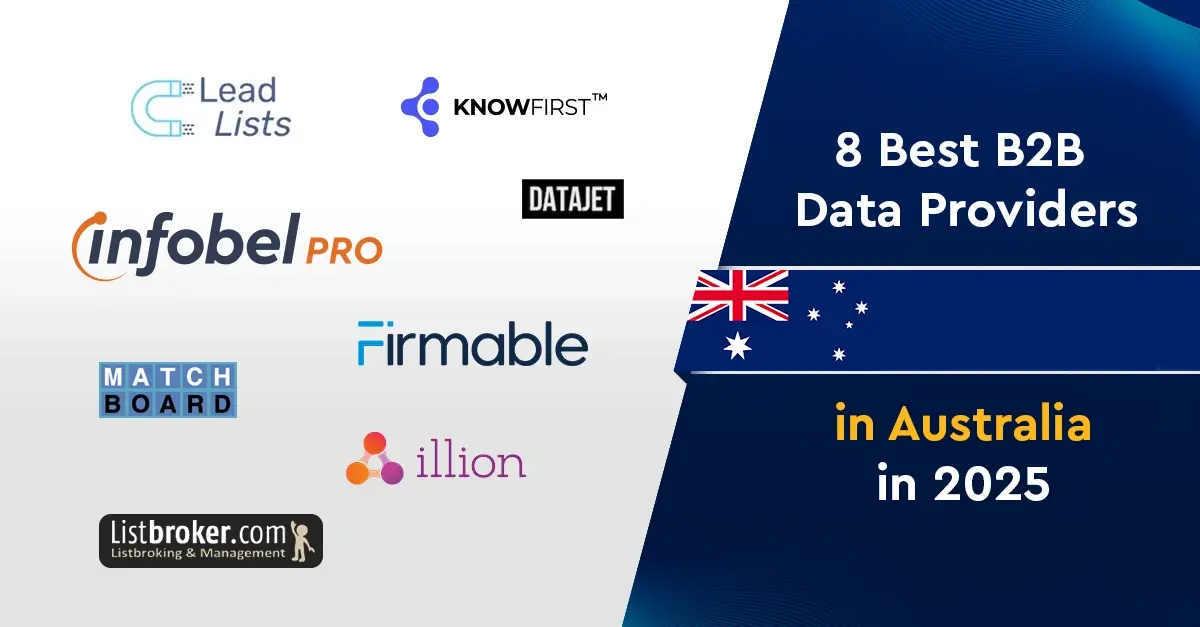
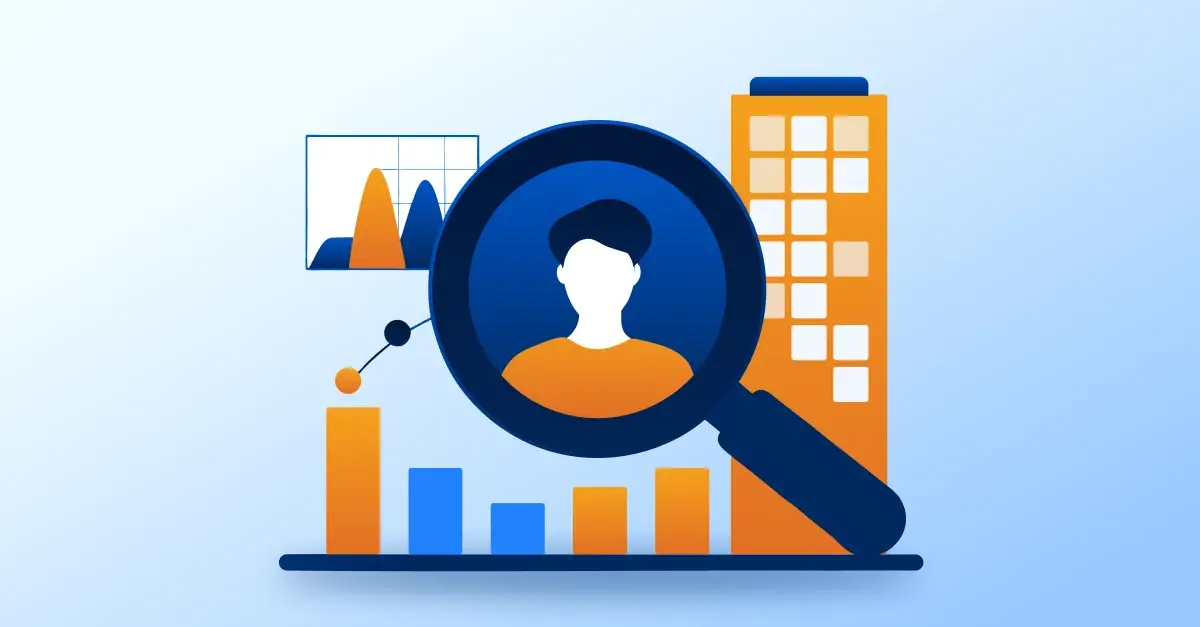
Comments